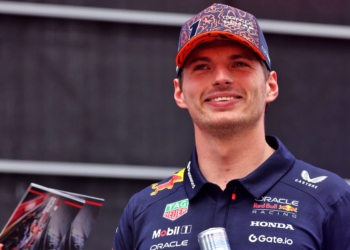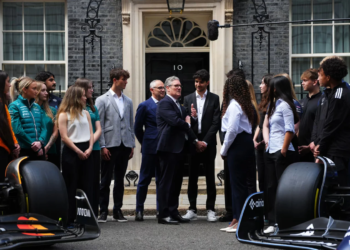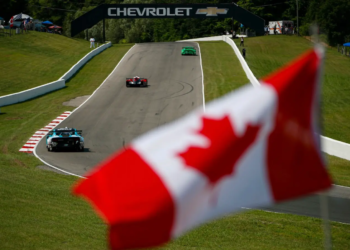We now are close to precisely 12 months on from the Thursday on which the F1 fraternity gathered in the Silverstone paddock for the start of the 2013 British Grand Prix weekend. But no sooner had everyone got something like into position than news of considerable gravitas had broken.
Mark Webber it was confirmed was off to drive sportscars for Porsche in LMP1 at the season’s end. That he was leaving Red Bull – following Malaysia, Multi 21 and all that – was no surprise. But this particular move as well as it being confirmed in the here and now was one that no one saw coming it seemed, least of all those in the Milton Keynes collective that he was part of.
As you’d expect come that afternoon’s drivers’ press conference Webber was the centre of attention. Yet it was something that Fernando Alonso said in the very same press conference when asked about Webber’s move that stuck in my mind particularly. His tone at Webber’s switch was empathetic; almost envious.
‘I think he’ll have a lot of fun behind the wheel, as he’s doing now, with a little bit of less problems outside the wheel that we have now in Formula One’ said Alonso. ‘We enjoy 19 Sundays a year and the rest of the time is a little bit of a stressful time. With the new series I think he will have a little bit more fun.’
It followed on too from fairly similar sentiments uttered by Alonso in his excellent interview with Mark Webber that was shown on the BBC earlier in that same 2013 campaign – recorded months before Webber confirmed that he was off.
‘We talk many times about what will be after Formula One’ said Alonso then. ‘We all enjoy this category so much, we know that this is the top. But we also know that there are more categories, there are more things to do and there are more fun cars to drive.’
‘Completely agree mate, things change’ was Webber’s response.
So, even though it didn’t appear to be impacting his driving, even though he was not minded to depart anything like on Webber’s timetable, even then it seemed Alonso was thinking about the big world of motorsport out there; what he might do next; what it might offer him.
Alonso’s view over time on this matter has shifted too. Back in his first spell at Renault – including when he started to win championships – he was one not to give much away on just about any subject. Yet he also was one often who gave the outward impression of being not all that keen on his goldfish bowl existence of F1 fame. Instead it seemed he was minded to go in, do his thing, and get out with his titles under his arm to go and live a quiet life somewhere, and do it all on a rather accelerated itinerary. This was to the point that after Alonso had won a couple of titles Bernie bemoaned that the Spaniard in conjunction with Kimi Raikkonen didn’t ‘act like World Champions, they’re not available or accessible, they don’t want to talk to people, don’t want to do anything.’
And on a rare occasion that the man himself spoke on the matter, Alonso appeared to confirm this thesis.
‘I started at 19 and I cannot be concentrated and keep on going until I am in my thirties’ he said back in 2005. And on his relatively anonymous existence living in Oxford at the time: ‘I prefer it. It’s like going to paradise. I can live my life. It’s much more relaxed and perfect between races.
‘If I want to go out to dinner in Spain I have to choose a restaurant where I know the owner, so that he can find me a table out of the way. Then I have to come in by the back door or go through the kitchen. It is all too much, so I only go for one or two days a month.’
But people change. And perhaps are especially likely to change in the course of spending several years as a front line F1 driver. You will have noted that in the event some years on Alonso contrary to his own predictions has indeed kept going in his thirties, now 32 and apparently in no hurry to quit the motorsport pinnacle. And over and above this has clearly been scanning the horizon for other forms that he can compete in when his F1 days are done.
As mentioned he hinted at it 12 months ago. And while given this it shouldn’t have been a surprise, Alonso in recent days spelled his thoughts out on the matter more explicitly.
Last weekend he showed up at Le Mans to start the famous 24 Hour race as the one waving the Tricolore. And upon being asked on Eurosport before the race if he’s minded to take part in it himself one day Alonso said ‘It’s a race that’s very attractive for all of the drivers; it’s very prestigious, so yes, I think one day before later I’ll come here.’
While a few days on, now at the Red Bull Ring preparing for the Austrian Grand Prix, Alonso gave further signal of his intent: ‘Le Mans requires some testing, some training and some dedication. I am a person who if I decide to do something I do it 100%; I don’t do it 50-50. So first I will try to do some more years in F1…but after that I won’t be able to sit on the sofa, and endurance is a category you can race when you are a little bit older with no big problems. That will be my intention.’
It’s easy to see more broadly why LMP1 has tempted both Webber and Alonso. International sportscar racing was once the sick man of motorsport, indeed all but died on its knees in the early 1990s (and actually did die in its Group C form). Now though it is in much more rude health than it has been in a good while, with rising popularity, fascinating technical rules as well as three prestigious manufacturers fighting it all out. And of course it has its blue riband event at Le Mans.
Either of them has spelled out that the more relaxed atmosphere of LMP1 is an attraction. Alonso too – just as Webber did before his exit – has started to bemoan aspects of the prevailing F1, particularly the necessity to drive within oneself in the sake of tyre preservation and the like.
I should point out also at this point that I do not expect Alonso’s F1 departure to be imminent. Further I find risible the ‘Alonso is running out of time’ comments that can routinely be stumbled across. Fernando Alonso is 32. That’s the same age as Alain Prost was in 1987, Ayrton Senna in 1992, Michael Schumacher in 2001. Not old by the standards of the F1 driver, and in none of those seasons mentioned do I recall comments from anyone suggesting those drivers were getting on a bit. Indeed for such drivers it then arguably was still just shy of their peak. It seems a peculiar view to the modern age to suddenly reckon that those the wrong side of 30 are to be chased out of the F1 exit door pronto.
Certainly physically there is no reason for Alonso to step away – as Alonso’s Twitter feed attests the man is incredibly fit as well as trains with relish. While in the modern age of tyre saving and the like there is clearly less of a physical toll on the drivers. Indeed Michael Schumacher once commented that after completing a Grand Prix distance in this era he felt that he could immediately step back in the cockpit and complete another one. And – though admittedly an outlying case – when Schumi stopped he was some 11 years older than Alonso is now.
The man himself concurs. In a recent BBC interview Fernando stated not for the first time that his third title remains unfinished business, the thing to achieve before he stops. But as well as that he also made clear that he doesn’t consider the clock to be ticking: ‘I think I can carry on long enough to win and to be competitive for some good years. I don’t know how many – three, five, seven. I don’t think it should be any problem.’
But still, without the intervention of cruel fate there will inevitably come a day wherein Alonso will have to decide what he does next. And possibly in no other sport are the options for the top performer upon stepping down from the very top so diffuse.
In plenty of other sports the beaten path is clear. In both tennis and golf there is a well-established senior circuit. In the likes of football and cricket the move into coaching and management is common. In just about any sport there’s the possibility of punditry and media work too.
But in all but the last point with F1 things are rather different. Coaching is not nearly as established as it is in other activities, while the previous of good ex drivers getting involved in the running of teams is not often an encouraging one (see Prost, Hill, Surtees and others). And there also is no ‘seniors’ event; the brief Grand Prix Masters competition of a few years back – only lasting for three races – being the closest to ever having one.
Many go off to the business world, some with great success such as Eddie Irvine, Niki Lauda and Jody Scheckter. Some not, such as James Hunt.
Some in fact do very little, seek a quiet life, as well as some have next to no interest in competing in other categories. An outlook that Alonso seemed to share back in the day, and indeed Michael Schumacher’s interest in participating in other forms of racing has always been well under control.
Adding to the diffuse nature of it all in motorsport there is furthermore a vast range of other categories that the ex F1 pilot can try their hand in. A few have gone off to DTM, though not always done that well alongside the tin top specialists, some – most recently Rubens Barrichello – have gone off to Indycar again with varied results. Kimi went rallying of course, as has – albeit in rather different circumstances – Robert Kubica. A few now are popping up in Formula E. Local touring car and stock car series also have picked up a few.
But as outlined the rising star of LMP1 ensures that it is once again a highly tempting and prestigious avenue for those whose F1 careers reach their twilight. By the looks of things sooner or later it’s going to capture F1’s brightest star of all. And that Fernando Alonso when his own F1 twilight arrives is now minded to get behind the wheel of other machines, rather than live a sedate existence back in Oviedo, is very good news for all of us.






